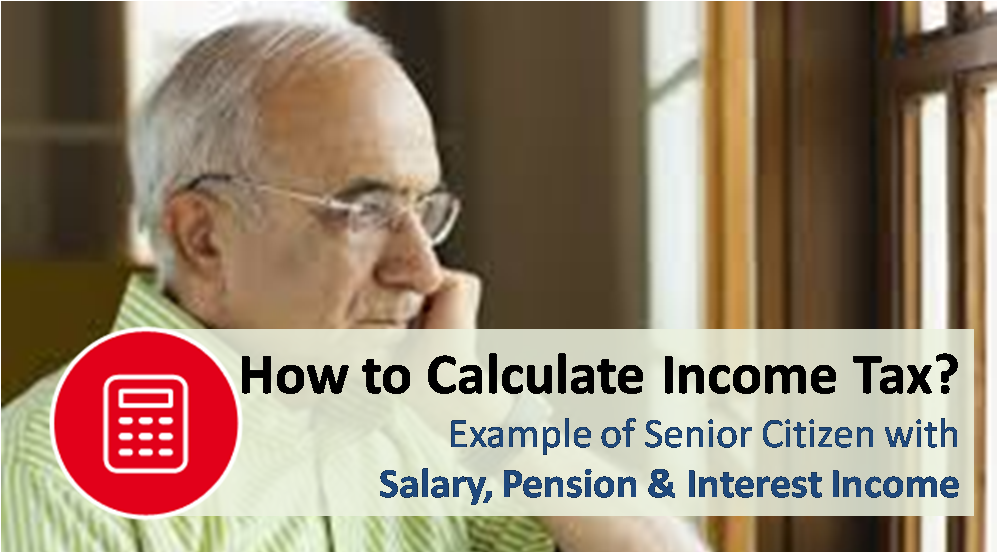I often get request to calculate income tax for readers and how they can save more tax! It’s not possible for me to calculate it for everyone. So going forward I would pick cases and show how to calculate income tax and if there is scope to save additional tax.
Below is the comment I received:
Dear Amit,
Pl calculate my income tax.
I would retire on 31 Jul 2019. My income from Apr 19 to Jul 19 is Rs. 2,50,000. Thereafter I would get pension @ Rs. 18,700 per month. As on 31 Mar 20 estimate interest on my FDs is Rs. 2,00,000. I have invested Rs. 2,00,000 in senior citizen scheme. Pl confirm how much income tax I have to Pay?
Download: Tax Planning Guide for FY 2019-20
Income Tax Calculation:
As far as possible I would use the format used in filing income tax returns so that its more helpful for everyone.
We first calculate the total income for the financial year (FY 2019-20)
- Income from Salary (April to July 2019) – Rs 4,00,000
- Income from Pension (August’19 to March’20) – Rs 1,49,600 (Rs 18,700 * 8)
- Income from Interest on Fixed Deposit – Rs 2,00,000
Total Income = Rs 7,49,600
The table below calculates the income tax:
| Header | Amount (RS.) | Remarks (FY 2019-20) |
| Income from Salary | 5,49,600 | Pension Income is considered as Salary Income |
| Income from Other Sources | 2,00,000 | Interest income is considered as income from other sources |
| Total Income | 7,49,600 | |
| Tax Saving/Exemption Sections | ||
| Standard Deduction | 50,000 | Applicable for Pension/Salary Income |
| Sec 80TTB (FD Interest Exemption) | 50,000 | Introduced in Budget 2018 for Senior Citizens |
| Senior Citizen Saving Scheme | 1,50,000 | Even if you invest Rs 2 Lakhs in SCSS the tax deduction would be limited to Rs 1.5 Lakhs only u/s 80C |
| Total Deduction | 2,50,000 | |
| Taxable Income | 4,99,600 | Total Income – Total Deduction |
| Tax Exemption Limit for Senior Citizens | 3,00,000 | |
| Net Taxable Income | 1,99,600 | Taxable Income – Exemption Limit |
| Tax @ 5% | 9,980 | The tax slab comes at 5% |
| Tax Rebate up to Rs 12,500 u/s 87A | -9,980 | The Taxable income is less than Rs 5 lakhs and hence eligible for Tax Refund u/s 87A |
| Net Income Tax | 0 | Tax – Tax Rebate |
| Health & Education Cess @ 4% | 0 | Cess increased to 4% in Budget 2018 |
| Total Income Tax Payable (including cess) | 0 | No Tax is Payable |
The total tax comes out to be NIL because of the increase in tax rebate u/s 87A and increase in Standard Deduction on Pension Income in Budget 2019. Additionally Section 80TTB (exemption up to Rs 50,000 on interest income) introduced in Budget 2018 helps further.
Also Read: 5 Key changes in Income Tax Rules from April 1, 2019 that you must Know
Recommendation to Save Tax if Income Increases:
Disclaimer: The recommendation is made based on limited information we have!
As he pays NO tax there is nothing much to worry. He could use following tax benefits in case the income increases:
- Sec 80GG in case you live on rent and do not own a house (deduction up to Rs 60,000)
- Section 80D for Health Insurance Premium
He is also eligible to submit Form 15H against his fixed deposits to prevent any TDS (Learn: How & when to Fill Form 15H?).
Also for senior citizens SCSS is one of the best investments for regular income. So he choose the right investment for tax saving.
Also Read: Best Tax Saving Investments u/s 80C
Let me know if this was helpful and you have any other suggestions!


The terminal benefits, such as Gratuity, Commutation of Pension and final Encashment of Earned leave, Leave on Private affairs, are totally / partially exempted from Income tax at the time of retirement of Central / State Government employees.
After retirement while getting pension amount, for Income Tax calculation, whether the take home pension, i.e. Basic Pension minus Commuted pension, be calculated (or) Basic pension be calculated?
This may please be clarrified.
Amitji,
Thanks for the great answer. However I feel that the questioner has not taken into account terminal benefits which he must have received during the period. Gratuity may be exempt from tax but leave encashment is not. Please clarify.
In Rule 64 of the Central Government Account Receipts and Payments Rules,1983 and also in Rule 217 of Central Treasury Rules it is clearly stipulated that the salary of March shall be paid on the first working day of April. As such for all purpose the salary of March in Government organizations is due and receivable/payable on or after 1st April.
Therefore, on accrual as well as cash basis, their salaries for the month of March is always assessable in the next Assessment Year only. For Tax calculations, Salary/Pension from MAR to FEB is counted.